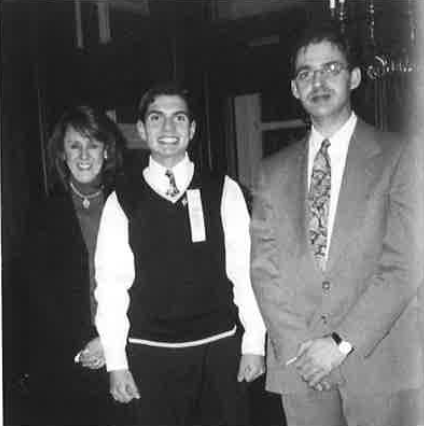From 1999 to 2001, Cabrini was my home. As an undergraduate student, I spent my days and evenings here. If there were a prize for time spent on campus by a commuter student, my bid would have been virtually uncontested. The connection I felt to this place was, for me, at the time, unparalleled and unprecedented.

That's me, center, with Professor Cynthia Halpern and Professor Juan Carlos Jimenez at the Phi Sigma Iota language honor society induction in 2000.
Long after I left this campus, I continued to carry Cabrini, and the lessons it instilled, with me. For me, this place was formative and transformative. Each academic achievement, each step in my professional path is rooted in my foundation here.
Cabrini cultivated in me an understanding of the value of community and compassion. This is a place where these values are not only taught; they are lived. For instance, during my senior year, a fire destroyed my family’s home. We were deeply touched by the Cabrini community’s response. Staff offered blankets. Faculty offered books. Friends offered consolation. I learned the value of community and compassion and generosity at a time when I lacked a home, lessons that continue to be invaluable to my family and to me today.
Cabrini elevated my adherence to notions of kindness and charity, to a commitment to equality and justice. As a student, I was involved with campus ministry. I went on retreats. I went to West Virginia. We discussed oppression. We discussed poverty. And we rebuilt homes.
The College also nurtured my aspirations to pursue graduate school and a career in social justice. Prior to Cabrini, I was cautioned against being too ambitious. Teachers, counselors actively deterred me from pursuing graduate school. (While never said overtly, there seemed to be an implicit message: Latino. Working class. Son of Immigrants. Why get my hopes up when my chances are so small?).
Here, the message was dramatically different and quite clear: If you wish to excel academically, we will mentor you. If you aspire to be a leader, we will train you. If you want to work for justice, we will prepareyou.
With close faculty mentoring, I pursued graduate school. I completed a Master’s in Latin American Studies, where I explored film as a vehicle for social change; a Master of Theological Studies, where I studied religious social movements; and a Juris Doctor, where I gained the legal skills to defend low-income people against deportation.
After working as a public interest immigration attorney for four years, I was eager to share my experiences and teach social justice to students at Cabrini. When I interviewed to join the faculty, I had the opportunity to sit down with President Taylor. He told me, “I have a vision for this college, and I believe you belong here. Abel, it’s time to come home.”
As you can imagine, this invitation meant a lot to me. But, as with any big career move, I have continuously reflected on my decision to return to teaching. I perpetually questioned whether this was the right choice. Is this where I belong? Is this where I am best suited to serve?
I believe I found my answer where all important truths are to be found: In office hours. At the end of the fall semester, one of my Latina students came to my office. She wanted to discuss her paper. As we talked, she confessed that she changed her schedule to take my class. She wanted to study with a Latino professor. Her dream is to become a lawyer. To serve those who face the possibility of banishment from our country but cannot afford an attorney. She believes if I was able to do it, she can do it. She has started talking to her family about her plans. She is finding her place, where she belongs. As she spoke, the questions faded. And as she left my office, I thought, “It’s good to be home.”